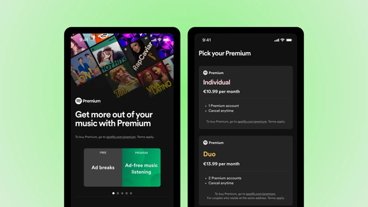Players complain about high data use from persistent internet in 'Super Mario Run'
Early reports of "Super Mario Run" taking up to 75 megabytes per hour of dedicated play were a bit too high, but not by much, as users complain about the persistent internet connection the game demands, as well as launch failures, forcing repeat downloads.
Initial reports from Apple Retail and other Apple employees with the game installed on their devices claimed that the game would use up to 75 megabytes per hour of near-constant play. AppleInsider has since learned that the iPhones on the demo stations would periodically wipe themselves, and force the level downloads that are mandatory right after the game launches for the first time a few times a day.
A series of (green) tubes
However, further testing has shown that while the level download packages are significant chunks, the data used is still not trivial for those on restrictive data plans with hard caps.
Aggravating the problem, the "Super Mario Run" servers were hammered on Thursday night and into Friday, similarly to the bludgeoning that players delivered to the "Pokemon Go" servers for a month after launch. As a result, not only was the game unplayable for some as a result of the persistent internet connection requirement, but the mandatory level pack downloads would also sometimes fail, forcing the app to re-download the data.
"Until the server load lightens up, and for that first level load, though, play on Wi-Fi" — Apple App Store engineer
As a result of sometimes repeated re-downloads, before playing beyond the tutorial, some users were seeing consumed data grow to well over 150 megabytes.
Several hours of testing the night of release by AppleInsider shows that discounting the effect of level downloads, a solid hour of constant play still pushed about 60 megabytes of data per hour. Social media reports vary somewhat, but most fall in the range of 40 to 60 megabytes per hour, with some higher and lower outliers that we are attempting to contact.
Behind the curtain
AppleInsider has spoken to engineering sources within the Apple iOS App Store who told us that consumed data will vary widely player to player.
"The game is chatty," we were told. "Nintendo's doing a lot of fat-packet data shuffling back-and-forth to its own back-end, and if a packet fails, it'll keep trying for a bit until it gives up and errors out. This is all data use."
As a result, we were told that customer's data use should fall a bit as the initial peak impact on the Nintendo servers wanes.
As examples of other more internet-heavy entertainment data needs, we were told that "Pokemon Go" can use 30 megabytes per hour, Microsoft's Xbox One "Halo 5" can consume up to 400 megabytes per hour, and the new "Battlefield 1" generally uses 250 megabytes per hour, but can peak at 500 megabytes per hour. A 1080p video streamed from iTunes can consume 1.5 gigabytes per hour.
Dealing with it
"Until the server load lightens up, and for that first level load, though, play on wi-fi," our Apple contact said. "Unless you're on Comcast, you're good to go, and if you hit the Comcast cap playing it, you've got other problems."
Most U.S. users on current pre-paid plans are throttled after a certain amount of data has been consumed. This, fortunately, will have little or no effect on gameplay. Data the game needs for individual runs is pre-cached, and not streamed while the game is actively being played.
However, consumers with overly restrictive caps will have problems with long-term use of the game on wireless networks, at least for the short term.
AppleInsider will continue to look into the app's data use as time goes on.
 Mike Wuerthele
Mike Wuerthele











 Chip Loder
Chip Loder
 Andrew Orr
Andrew Orr
 Marko Zivkovic
Marko Zivkovic
 David Schloss
David Schloss

 Malcolm Owen
Malcolm Owen

 William Gallagher
William Gallagher






